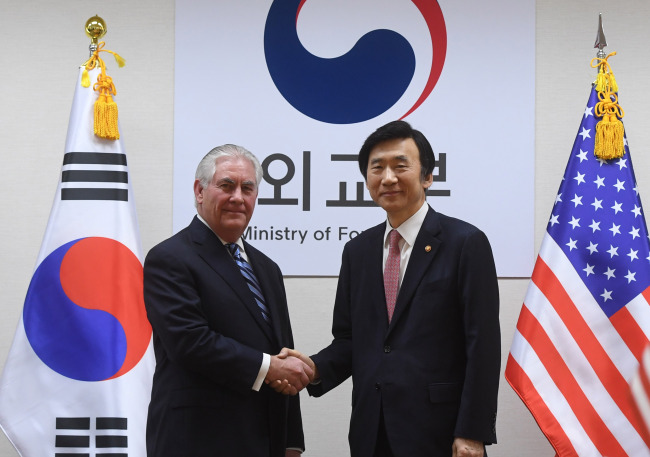For Seoul, US State Secretary Rex Tillerson’s first visit last week was significant in many aspects. He sent a strong message to North Korea on its nuclear program, issued open criticism for China’s economic retaliation against South Korea over THAAD, and helped defuse concerns about the bilateral ties under the Donald Trump administration.

But his trip was overshadowed chiefly by controversy over the decision not to have a dinner meeting with South Korean Foreign Minister Yun Byung-se. Not because he skipped it, but because of how it was handled before and after.
To be clear, his schedule was settled before he touched down here, and this was shorter than previous visits by secretaries of state, and than his visit to Japan. I did not mean to sugest he had changed his plans. It’s true that Tillerson did not call off or cut short any prearranged events, as State Department acting spokesperson Mark Toner explained during a Monday briefing.
During consultations in the run-up to Tillerson’s arrival, however, the US team said he would be too tired and have his own dinner plans, according to Seoul officials who would only talk on condition of anonymity. As controversy simmered toward the end of his visit, he said during an interview that Seoul had never made any offer but put out a statement because “optically it wasn’t playing very well in public for them.”
The Foreign Ministry tried to accommodate the secretary, taking the tour as a chance to create a rapport with the new US administration, despite a leadership vacuum and transitional uncertainties at home.
Albeit rare, there have been occasions in the past where the two countries’ top diplomats skipped a lunch or dinner meeting amid a tight schedule. Instead a US secretary would usually meet with embassy staff and their families and some of the 28,500 soldiers stationed here, or attend public diplomacy events. Tillerson did not do that either.
There could be several reasons for his decision -- perhaps some of them being practical ones. Tillerson’s team might have thought it wouldn’t be necessary to have dinner with an outgoing minister, given South Korea will elect a new president on May 9. As Seoul officials said later on, there might also have been confusion within his team. Working-level cooperation will continue as usual anyway. The two ministers were going to see each other soon again, with Yun due in Washington on Tuesday to take part in an international ministerial conference against the Islamic State extremist group. And maybe, Tillerson was indeed fatigued.
Whatever the reason, the bottom line is that his schedule was the product of a series of back-to-back consultations. The host country does not -- or essentially cannot -- decide whether a US secretary is going to do something or not, contrary to Tillerson’s argument. That has never been the case.
His choice of words during the Independent Journal Review interview stoked another debate. The secretary defined Japan as “our most important ally in the region” in terms of security, economy and stability, whereas South Korea is a “similarly important partner” but its government is “not in place” and the attention on the country has been dominated by North Korean provocations. Though Tillerson himself warned against supposing “some kind of imbalance” in the relationships, his words resulted in a fresh bout of speculation both in Seoul and Washington over their diplomatic implications.
The ongoing furor could partly be attributable to internal issues, namely his controversial choice to travel without a press corps. Yet a shrewd, considerate diplomat, at the helm of a storied organization that safeguards peace, democracy and rule of law across the globe, should not accuse a 60-year ally of giving a false explanation for its domestic interests, whatever his or her background may be. Language is a critical component of foreign relations -- a simplest word could be read as a diplomatic gesture.
By Shin Hyon-hee (heeshin@heraldcorp.com)




![[Herald Interview] 'Amid aging population, Korea to invite more young professionals from overseas'](http://res.heraldm.com/phpwas/restmb_idxmake.php?idx=644&simg=/content/image/2024/04/24/20240424050844_0.jpg&u=20240424200058)












![[KH Explains] Korean shipbuilding stocks rally: Real growth or bubble?](http://res.heraldm.com/phpwas/restmb_idxmake.php?idx=652&simg=/content/image/2024/04/25/20240425050656_0.jpg&u=)

